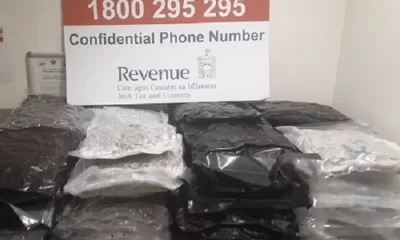Business
Arizona Jail Detention Officer Arrested for Dealing Meth, Fentanyl

Lower Buckeye Jail in Phoenix, Arizona is tackling the flow of drugs and corruption.
Drugs on demand, straight from a jail guard, were shut down by the sheriff at the Lower Buckeye Jail in Phoenix, Arizona.
According to Maricopa County Sheriff Paul Penzone, a detention officer was arrested for attempting to bring methamphetamine and fentanyl into the Lower Buckeye Jail in Phoenix, Arizona.
Fox 10 reports that detention officer Andres Salazar faces several drug-related felony counts. A money exchange took place in the parking lot of the jail before Salazar attempted to bring a package containing about 100 pills into the jail.
“This was an ongoing investigation,” Penzone said at a press conference on Jan. 11. “This detention officer was hired in October 2019, recently worked with inmates and some folks on the outside, and attempted to bring fentanyl and methamphetamine into the jail.”
Salazar apparently wasn’t very good at it, a regrettable choice that will impact his future. “We have strong reason to believe this was his first attempt,” the sheriff said.
“This young man, whatever led him to make this decision, will now not only lose his career, but most likely the future that he has for himself is definitely going to be hindered in an adverse way,” Penzone said.
The drug problem is bad: In Maricopa County jails in 2022, 172 inmates were taken to the hospital for overdose or drug-related incidents; 17 in-custody deaths were caused by an overdose, or drugs were a major contributing factor to the deaths; 194 inmates tested positive for some type of drug through a urine sample; and 114 of those inmates tested positive for fentanyl specifically.
The County says that 150 inmate postcards were intercepted in the mailroom that tested positive for being soaked in fentanyl and/or methamphetamine. “Since October 2022, 1,503 detention officers, sergeants and lieutenants were trained to deploy Narcan,” the sheriff said.
A Pattern in the U.S. Criminal Justice System
This kind of thing isn’t unheard of in the criminal justice system: In 2021, Marc Antrim, a former Los Angeles County sheriff’s deputy, was sentenced for orchestrating a fake drug raid, stealing over half a ton of cannabis and $600,000 in cash from a warehouse.
Three South Carolina prison guards were arrested in 2018 for smuggling drugs and other contraband into two different correctional institutions. In one of those incidents, a guard attempted to smuggle in 143 grams, or about five ounces of pot into a detention center.
Think that drugs are out of reach in the prison and jail systems? Think again: According to the National Institute of Drug Abuse, there are “high” rates of substance use within the criminal justice system. Specifically, some research shows that an estimated 65% percent of the United States prison population has an “active substance abuse disorder,” and they have to get those drugs from somewhere. It’s one of the best arguments to say that drugs won the War on Drugs.
Maricopa County, however, is tackling the problem with some new changes.
Maricopa County Fights Drugs, Corruption in Jail
Penzone is now taking action proactively to prevent incidents like this from happening again under his watch. KTAR News reports that the sheriff announced scanning machines will soon be installed at jailhouses to detect drugs and other contraband entering and exiting the facilities, authorities announced Wednesday.
“I’m at a stage now where I think it’s not only important but appropriate that we purchase scanning machines so that every individual who enters our jail—whether it be staff/volunteers—anybody and everyone who enters into the secured population will be checked to determine if we can mitigate and intercept any potential contraband coming into the jail,” Penzone said.
“If we need to upgrade the entire system in the entire jail system, I’m willing to do that,” Penzone said. “But we’re going to find the one that is the most effective and put it in play in all of our jails as soon as possible.”
Drugs such as fentanyl and methamphetamine rank high in the danger level.
According to the U.S. Drug Enforcement Administration (DEA), fentanyl is the deadliest drug threat facing this nation. “In 2021, a record number of Americans—107,622—died from a drug poisoning or overdose,” the DEA release reads. “Sixty-six percent of those deaths can be attributed to synthetic opioids such as fentanyl.”
Source: https://hightimes.com/news/arizona-jail-detention-officer-arrested-for-dealing-meth-fentanyl/
Business
New Mexico cannabis operator fined, loses license for alleged BioTrack fraud

New Mexico regulators fined a cannabis operator nearly $300,000 and revoked its license after the company allegedly created fake reports in the state’s traceability software.
The New Mexico Cannabis Control Division (CCD) accused marijuana manufacturer and retailer Golden Roots of 11 violations, according to Albuquerque Business First.
Golden Roots operates the The Cannabis Revolution Dispensary.
The majority of the violations are related to the Albuquerque company’s improper use of BioTrack, which has been New Mexico’s track-and-trace vendor since 2015.
The CCD alleges Golden Roots reported marijuana production only two months after it had received its vertically integrated license, according to Albuquerque Business First.
Because cannabis takes longer than two months to be cultivated, the CCD was suspicious of the report.
After inspecting the company’s premises, the CCD alleged Golden Roots reported cultivation, transportation and sales in BioTrack but wasn’t able to provide officers who inspected the site evidence that the operator was cultivating cannabis.
In April, the CCD revoked Golden Roots’ license and issued a $10,000 fine, according to the news outlet.
The company requested a hearing, which the regulator scheduled for Sept. 1.
At the hearing, the CCD testified that the company’s dried-cannabis weights in BioTrack were suspicious because they didn’t seem to accurately reflect how much weight marijuana loses as it dries.
Company employees also poorly accounted for why they were making adjustments in the system of up to 24 pounds of cannabis, making comments such as “bad” or “mistake” in the software, Albuquerque Business First reported.
Golden Roots was fined $298,972.05 – the amount regulators allege the company made selling products that weren’t properly accounted for in BioTrack.
The CCD has been cracking down on cannabis operators accused of selling products procured from out-of-state or not grown legally:
- Regulators alleged in August that Albuquerque dispensary Sawmill Sweet Leaf sold out-of-state products and didn’t have a license for extraction.
- Paradise Exotics Distro lost its license in July after regulators alleged the company sold products made in California.
Golden Roots was the first alleged rulebreaker in New Mexico to be asked to pay a large fine.
Source: https://mjbizdaily.com/new-mexico-cannabis-operator-fined-loses-license-for-alleged-biotrack-fraud/
Business
Marijuana companies suing US attorney general in federal prohibition challenge

Four marijuana companies, including a multistate operator, have filed a lawsuit against U.S. Attorney General Merrick Garland in which they allege the federal MJ prohibition under the Controlled Substances Act is no longer constitutional.
According to the complaint, filed Thursday in U.S. District Court in Massachusetts, retailer Canna Provisions, Treevit delivery service CEO Gyasi Sellers, cultivator Wiseacre Farm and MSO Verano Holdings Corp. are all harmed by “the federal government’s unconstitutional ban on cultivating, manufacturing, distributing, or possessing intrastate marijuana.”
Verano is headquartered in Chicago but has operations in Massachusetts; the other three operators are based in Massachusetts.
The lawsuit seeks a ruling that the “Controlled Substances Act is unconstitutional as applied to the intrastate cultivation, manufacture, possession, and distribution of marijuana pursuant to state law.”
The companies want the case to go before the U.S. Supreme Court.
They hired prominent law firm Boies Schiller Flexner to represent them.
The New York-based firm’s principal is David Boies, whose former clients include Microsoft, former presidential candidate Al Gore and Elizabeth Holmes’ disgraced startup Theranos.
Similar challenges to the federal Controlled Substances Act (CSA) have failed.
One such challenge led to a landmark Supreme Court decision in 2005.
In Gonzalez vs. Raich, the highest court in the United States ruled in a 6-3 decision that the commerce clause of the U.S. Constitution gave Congress the power to outlaw marijuana federally, even though state laws allow the cultivation and sale of cannabis.
In the 18 years since that ruling, 23 states and the District of Columbia have legalized adult-use marijuana and the federal government has allowed a multibillion-dollar cannabis industry to thrive.
Since both Congress and the U.S. Department of Justice, currently headed by Garland, have declined to intervene in state-licensed marijuana markets, the key facts that led to the Supreme Court’s 2005 ruling “no longer apply,” Boies said in a statement Thursday.
“The Supreme Court has since made clear that the federal government lacks the authority to regulate purely intrastate commerce,” Boies said.
“Moreover, the facts on which those precedents are based are no longer true.”
Verano President Darren Weiss said in a statement the company is “prepared to bring this case all the way to the Supreme Court in order to align federal law with how Congress has acted for years.”
While the Biden administration’s push to reschedule marijuana would help solve marijuana operators’ federal tax woes, neither rescheduling nor modest Congressional reforms such as the SAFER Banking Act “solve the fundamental issue,” Weiss added.
“The application of the CSA to lawful state-run cannabis business is an unconstitutional overreach on state sovereignty that has led to decades of harm, failed businesses, lost jobs, and unsafe working conditions.”
Business
Alabama to make another attempt Dec. 1 to award medical cannabis licenses

Alabama regulators are targeting Dec. 1 to award the first batch of medical cannabis business licenses after the agency’s first two attempts were scrapped because of scoring errors and litigation.
The first licenses will be awarded to individual cultivators, delivery providers, processors, dispensaries and state testing labs, according to the Alabama Medical Cannabis Commission (AMCC).
Then, on Dec. 12, the AMCC will award licenses for vertically integrated operations, a designation set primarily for multistate operators.
Licenses are expected to be handed out 28 days after they have been awarded, so MMJ production could begin in early January, according to the Alabama Daily News.
That means MMJ products could be available for patients around early March, an AMCC spokesperson told the media outlet.
Regulators initially awarded 21 business licenses in June, only to void them after applicants alleged inconsistencies with how the applications were scored.
Then, in August, the state awarded 24 different licenses – 19 went to June recipients – only to reverse themselves again and scratch those licenses after spurned applicants filed lawsuits.
A state judge dismissed a lawsuit filed by Chicago-based MSO Verano Holdings Corp., but another lawsuit is pending.
Source: https://mjbizdaily.com/alabama-plans-to-award-medical-cannabis-licenses-dec-1/
-

 Business2 years ago
Business2 years agoPot Odor Does Not Justify Probable Cause for Vehicle Searches, Minnesota Court Affirms
-

 Business2 years ago
Business2 years agoNew Mexico cannabis operator fined, loses license for alleged BioTrack fraud
-

 Business2 years ago
Business2 years agoAlabama to make another attempt Dec. 1 to award medical cannabis licenses
-

 Business2 years ago
Business2 years agoWashington State Pays Out $9.4 Million in Refunds Relating to Drug Convictions
-

 Business2 years ago
Business2 years agoMarijuana companies suing US attorney general in federal prohibition challenge
-

 Business2 years ago
Business2 years agoLegal Marijuana Handed A Nothing Burger From NY State
-

 Business2 years ago
Business2 years agoCan Cannabis Help Seasonal Depression
-

 Blogs2 years ago
Blogs2 years agoCannabis Art Is Flourishing On Etsy













